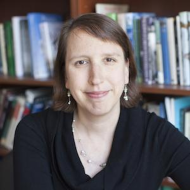When Joylette Portlock first started DoSomethingAboutClimate.com with her husband last year, she said that she had a “personal desire to do something impactful.” Since then, this Stanford PhD has developed a witty video series about climate change, rooted in the science with thoughtful ideas on how to take action. This month she is cutting episode number 16, but she took time away from her busy schedule to chat with me about her video series, the inspiration, life in the Rust Belt, and what she thinks people need to do about climate change.
Q. How do you choose which topic to talk about?
A. Someone asked me in the beginning whether I would have enough material for videos, and I said, are you kidding? We are never going to run out of material! Climate change is a complex subject; right now we have on our drawing board dozens of episode concepts. Deciding which one of them to do just becomes a question of what feels right in the moment, what seems like it would be fun to do next, and what seems topical in the news that we could tie in.
Q. You’re located in Pittsburgh, a city that has transformed from a coal capital to a green city. Is that something you think about when you are working on these videos?
A. Living in Pittsburgh has informed our thinking on these subjects. The city is undergoing a process of reinvention, which is great to see, and it is also great to see that so much of it is environmentally friendly. At the same time, the coal industry is still here and it is basically ground zero for fracking. You see the interplay of the economic realities of the situation as well as the environmental realities. These issues come up and deepen our understanding of the subject.
Q. Who is your audience?
A. Pretty much anyone who watches a YouTube video. I really approach this as a scientific literacy issue. For us to have an informed public debate about climate change, we need an informed public. This is really an effort to make a resource available to people who aren’t going to get this information in some of the more traditional ways.
Q. What is the greatest challenge to people understanding climate change?
A. One thing that I have taken to heart is that you are not going to depress people into action. It’s hard with climate change, which has far-reaching and serious consequences, but if you give people the doom and gloom, they will tune you out. We know that the subject matter is complex, so we present things in easy-to-understand nuggets of information so you can watch it quickly and take something away that doesn’t require a big time investment.
Q. Do you see similarities between science denial with climate change and science denial in relation to evolution?
A. As a society, we have climate change pigeonholed as a political issue, and if you have a hot-button political issue, then people are less likely to talk about it with their friends and family. If people aren’t talking about it, it’s so much harder to correct this misinformation. There is the old saying: you don’t talk about politics or religion. There is a lot of truth to that. If you can put these science subjects in one of those two boxes, then people don’t talk to each other about them. Nobody brings up climate change at family gatherings anymore. Nobody talks about it as they would any other scientific topic because it has this heavily charged stigma. With evolution, it is in a religious box that no one wants to touch. That is really unfortunate, and it is our job as educators and scientists to pull it out of that box. If you want to talk about policies to deal with climate change, that is a political argument we can fight over—but the science is not Republican or Democratic or anything. Our job is to fight the sources who try to turn this into a party issue.
Q. What should people do about climate?
A. In the short term, don’t be afraid to learn and talk about the subject. We need to roll up our sleeves and start to talk about the way we get energy, and to do that we have to stop being afraid or blind about the problem.
In the long term, people should support policies that will make us less dependent on fossil fuels. We need to have people support efforts to incorporate the full cost of fossil fuel use into the cost of doing business. Be engaged, because the policy is what is going to make the difference.
Q. Any last thoughts?
A. My final thought is the importance of humor and the realistic approach. The shock and awe of the magnitude of the problem is important, I don’t want to lose that; but I want to talk to people in a way they understand and in a way they feel confident to act. To do that we need a lot of humor.
You can see more of Joylette's videos and learn more about climate change at DoSomethingAboutClimate.com.

